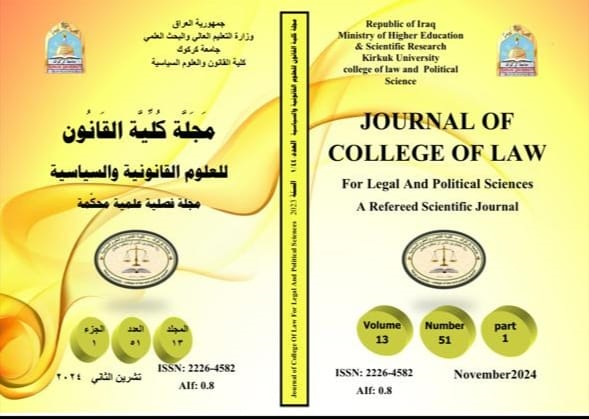Abstract
The jurists differed regarding the role of the legislator in arranging the effects of the contract, between one who narrows it and one who expands it. As a result, we have three principles: The principle of willpower, the principle of (Al-Jaleiya), and the principle of (Al-Eimda). The legal studies have dealt with the principle of willpower and the principle of (Al-Jaleiya). So we will add in this research the third principle, which is the principle of (Al-Eimda) in Imami jurisprudence, which was not studied previously, according to the extrapolation of the available legal sources, and the research reached to the following results:-
(1) The role of the legislator in arranging the effects of the contract in the Iraqi civil law, proceeds according to The principle of willpower but with restricted it, where it gives the will of the contracting parties a role in arranging the effects of the contract, but restricts it with several restrictions, the most important of which are: public order and morals, as in Article (75) of it.
(2) As for the role of the legislator in arranging the effects of the contract in the four well-known Islamic schools of thought, Hanafi, Maliki, Shafi’i and the Hanbali, it is governed by the principle of (Al-Jaleiya), which is limiting the role of the contracting parties’ will in the formation of the contract only, while its effects are by the law.
(3) Whereas in the Imami school, the role of the legislator is in arranging the effects of the contract, according to the principle of (Al-Eimda), whereby the two contracting parties arrange the effects of the contract, subjected to custom approval, then to the law approval, to be valid and binding effects.
(4) According to the principle of (Al-Jaleiya), the legislator has the right to arrange some effects, even the contracting parties do not want them, unlike the principle of (Al-Eimda), it will not add an effect that was not originally arranged, so the two contracting parties will be safe from the element of surprise. The principle of (Al-Eimda) in Imami jurisprudence leads to the stability of transactions, by finding a balance between the will of the contracting parties, custom and Sharia.
(5)The principle of (Al-Eimda) signifies what is sanctioned by custom for the effects established by the contracting parties. It adopts a double standard, from the personal doctrine, represented by the will of the contracting parties, and from the material doctrine, represented by the custom, so this principle does not limit the role of the will to the stage of establishing the contract, as in the principle of (Al-Jaleiya), which is embodied in the adoption of the materialistic doctrine only, with regard to the effects of the contract.
